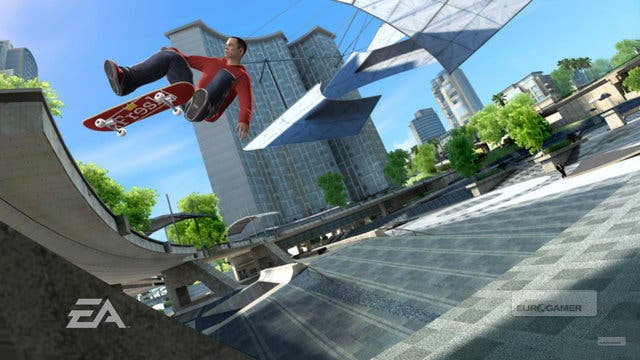For Ten Dollars More?
Is EA's controversial bonus DLC worth it when you have to pay?
In other words, while there's not much value in paying the extra VIP cost, a lot of players will eventually feel obligated to do it anyway, resulting in bad feeling for Bad Company.
If there's an EA game that has come closest to getting the "ten dollar" philosophy right from a player's perspective, it's Skate 3. The locked-off content for this knee-skinning skateboard sim is social in nature, not gameplay-related. Cash in your code and you get access to community features that let you share your own skate park designs and upload videos and pictures, as well as opening up other players' creations and clips for your amusement.
Nothing essential, in other words, but the sort of features that certainly enhance the game. And since those without a code can buy the Skate Share pack for just 800 Microsoft Points or £7.19 on PSN, it's an easier impulse purchase to make if and when you decide you need to connect.
It's perhaps revealing that the first non-EA game to dip a toe in these premium DLC waters has opted for a similar approach. THQ's UFC Undisputed 2010 cordons off its online features for those with codes, but buying in costs just 400 Microsoft Points or £3.19 on PSN. It's easy to bristle at competitive brawling being sectioned off, especially if you don't have friends to play against on the sofa, but by framing the online action as a camp where you can socialise with other fighters, train alongside them and set up sparring matches, it's a little easier to swallow.

It's unlikely that the core concept of Project Ten Dollar will go away any time soon. It costs the publishers very little to implement, and presumably holds back the tide of early trade-ins, at least for that all-important post-launch honeymoon period. For the gamer who eventually picks up these games second-hand, the situation is less clear cut.
The DLC on offer, at least so far, is usually good enough to make for a pleasant freebie, but often doesn't do enough to entice those customers at the other side of the deal. Most of the time, second-hand owners will feel compelled to pay up not because they're getting something uniquely enjoyable, but because the game has been designed to feel incomplete without it. In other words, EA is twisting their arms rather than taking them by the hands, and it's doubtful how long manhandling customer expectations will pay off for. As long as they're available, people are unlikely to stop buying used games - but they may stop buying DLC if they feel they're being treated like second-class customers just for their frugal shopping choices.
But there is some hope. By picking the right part of the game to fence off, choosing something that is inessential yet desirable, and not pricing it at ridiculous levels just to punish second-hand buyers, publishers could still claw back some money from the used market without splitting their communities in half. Whether corporate giants will be able to see the long-term benefits of more carrot, less stick is another question...
